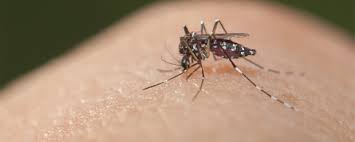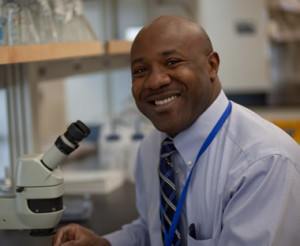Above, the University of Florida scientific team assembled in front of the Public Health Laboratory in Gressier, Haiti. L to R: Dr. Bernard Okech, Meer Alam, Dr. Antony Maurelli, Dave Pittman, Massimiliano Tagliamonte, Maha Elbadry and Dr. Madsen Beau De Rochars.
Will Mayaro Virus Spread as Chikungunya, Dengue and Zika Have?

CDC.Gov
Scientists at the University of Florida (UF) have found, are investigating, and have contributed to medical literature about a new Caribbean infection: the Mayaro virus.
The virus was discovered in a blood sample taken in 2015 from an 8-year-old boy in rural Haiti was identified by Maha Elbadry. She is a University of Florida Health Emerging Pathogens Institute (EPI) post doctoral researcher.
[Watch: First There Was Zika. Will Mayaro Virus Scare Be Next? ]

Left, Maha Elbadry
Elbadry, who was born in Egypt, examined the plasma samples before they were sent to the EPI to look for the Chikungunya, Dengue and Zika viruses. The boy was found to have the Dengue virus and what turned out to be Mayaro.
Elbadry received her PhD in Public Health from the University of Florida, and her BS in Chemistry and Entomology from Cairo University.
What is Mayaro’s impact?
Mayaro’s symptoms are similar to those of Chikungunya, and include abdominal, joint, and muscle pain, fever and rashes.
Besides Elbadry, there were other diverse researchers that worked with her in Haiti and who co-authored the study, Mayaro Virus in Child with Acute Febrile Illness, Haiti, 2015, published recently in the Centers for Disease Control and Prevention’s journal Emerging Infectious Diseases.

Valery E. Madsen Beau De Rochars is a Research Assistant Professor in the UF Health Services Research, Management & Policy Unit. He served as an EPI coordinator for underground research in the Gressier, Haiti research laboratory.
The ex-Epidemic Intelligence Service Officer for Centers for Disease Control and Prevention earned a Masters in Public Health degree from the Rollins School of Public Health at Emory University, where he focused on Health Policy and Management. He received his MD degree from the State University of Haiti.

Bernard A. Okech is a Research Associate Professor at the University of Florida. His specialties are Medical Parasitology: the study of three major groups of animals, parasitic protozoa, parasitic helminths (worms), and arthropods that cause disease directly or act as vectors of pathogens, and Medical Entomology. It “deals with insects that cause disease or that serve as vectors of organisms that cause disease in humans.”
Okech, originally from Kenya, received his PhD in Entomology/Parasitology from Kenyatta University, Nairobi, Kenya, his MS in Medical Parasitology from the University of Nairobi, Nairobi Kenya, and his BS (Honors) in Biological Sciences from Jomo Kenyatta University of Agriculture and Technology, Nairobi, Kenya
Okech is the founder and director of Okech Laboratory Research at the University of Florida, in the Department of Environmental and Global Health and Emerging Pathogens.







